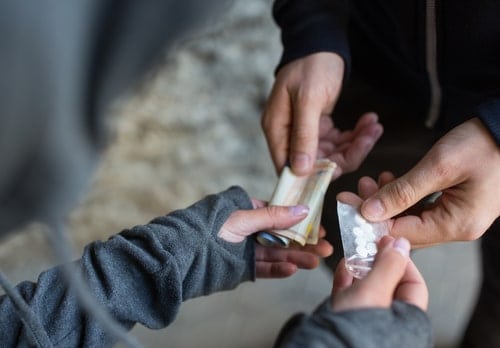Military members often struggle with drug use at a higher frequency when compared to regular citizens. While the military has a zero-tolerance policy for drug use, many still use anyways. Drug use is also a huge problem amongst veterans who are struggling with mental health issues because of their time in the military. To learn more about military drug use and how you can help someone addicted to drugs in your life, keep reading.
Military Drug Use Statistics
More than one in ten veterans have been diagnosed with a substance use disorder, which is higher than the general population. The same study found that substance use disorders were specifically higher in male veterans aged 18-25 when compared to the same age group of non-veterans.
The same study found that reported uses of different drugs were low amongst military members, though this is believed to be because the study asked military members to self-report. Because the military has a zero-tolerance policy for drug use, and members can be dishonorably discharged for using, many likely lied when taking the survey.
Types of Drugs Frequently Used by Active Duty Military and Veterans
Amongst both active military and veterans, many different types of drugs are used. The most commonly used drugs amongst these parties include:
- Marijuana
- Cocaine
- Opioids
- Benzodiazepines
- Alcohol
- Nicotine
The type of drug used amongst either party (veteran vs. active military) varies greatly. While active military participants were more likely to use drugs like opioids and cocaine, veterans were more likely to use drugs like marijuana and benzos. It seems that active military members used drugs as a way to keep going or ignore pain, while veterans turned to drugs as a way to relax or dismiss anxiety.
Drug Use Amongst Active Duty Military
Alcohol use disorders were the most prevalent type of addiction amongst active-duty personnel. It’s said that increased exposure to combat and traumatic situations often drives military personnel to drink more. Younger active military members may also drink more because they’re still young, and they haven’t been exposed to alcohol before. Peer pressure can also be extreme in the military, as it often seems like most members are drinking alcohol when they have the time. On top of that, alcohol use is allowed (though discouraged), while other drug use is prohibited, which makes it easier to get away with.
Opioids are also often misused by active-duty military personnel, likely because of any injuries they experience while fighting. Because opioids are highly addictive and offer a euphoric sensation, they can be difficult to quit. They may be seen as a way to escape for military members, leading to misuse.
Drug Use Amongst Veterans
Drug use amongst veterans is often more serious. For one, they aren’t restrained by the zero-tolerance policy anymore, meaning they can use drugs whenever they want to without having to worry about being discharged. On top of that, they’ve also returned home from a traumatic experience. Many studies show that the more trauma a veteran experienced, the more likely they would be to develop a substance use disorder once they returned home.
As we mentioned previously, veterans tend to use more sedative drugs, using them as a way to cope with their post-traumatic stress disorder. Using drugs as a way to escape is common amongst anyone struggling with their mental health, but especially so for veterans.
Benzodiazepines are often prescribed for PTSD and panic attacks. Unfortunately, it’s easy to become addicted to benzos even when using them as prescribed. When the prescription ultimately runs out, users may turn to other drugs as a way to cope with the withdrawal symptoms.
Not only that, but veterans also struggle with injuries after they return home, often dealing with chronic pain or requiring surgery. Because of this, they may be prescribed opioids, which can also lead to addiction.
Factors that Cause Addiction in Active Duty Military and Veterans
Active duty military members and veterans go through a lot and have a lot to deal with upon returning home. While post-traumatic stress disorder is often the first to come to mind, it isn’t the only problem that they have. For example, homelessness and long-term injuries are both common issues amongst veterans, as is suicide.
Post Traumatic Stress Disorder
After returning home from the military, it can be difficult for veterans to adjust. They may feel depressed, anxious, or even stressed throughout their everyday life. If they experienced any trauma while overseas (like many do), they may be at risk for developing post-traumatic stress disorder upon returning. PTSD causes flashbacks, increased stress, triggering events, and more. Doctors often prescribe medication (such as benzos) to decrease the symptoms.
However, when left untreated, veterans may turn to other drugs or alcohol as a coping mechanism.
Chronic Pain
If a veteran suffered an injury while in the military, chronic pain is also common. Dealing with chronic pain can be difficult, even disabling. Those who suffer from chronic pain may also turn to drugs or alcohol as a coping mechanism. Some may even be prescribed opioids, which can lead to misuse.
Homelessness
Unfortunately, homelessness rates are high amongst veterans, and being homeless is a huge risk factor for substance use disorder. Many may turn to drugs or alcohol as a way to cope with their situation, ultimately only making their situation worse. Unfortunately, when a situation feels inescapable, people often don’t care what they do to their bodies and minds beforehand.
Suicide
Suicide rates are high amongst veterans and active-duty personnel, and drug use often supercedes suicide. Those who are extremely depressed or suffering from other mental health problems may use drugs and alcohol as a way to cope. Unfortunately, this only works for so long, and can eventually lead to suicide when it feels like there’s no other option.
Providing Treatment for Current or Past Members of the Military
If you’re in the military (or you’re a veteran) and you’re looking for treatment for your substance use disorder, we’re here to help. To learn more about our treatment programs and how we can help you get and stay sober, call Asheville Recovery Center today to speak with an addiction specialist.









